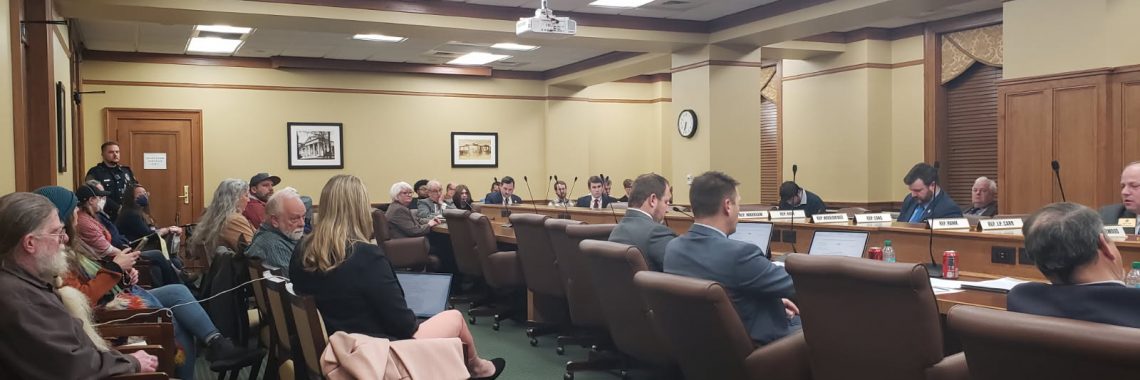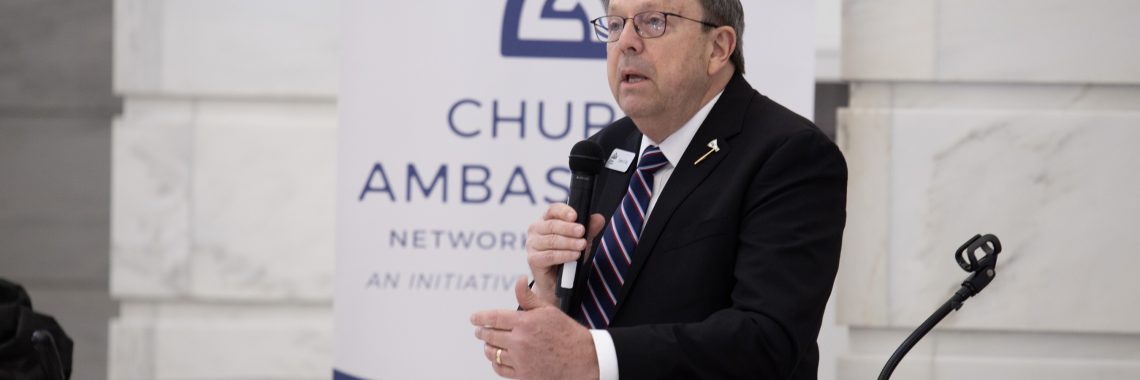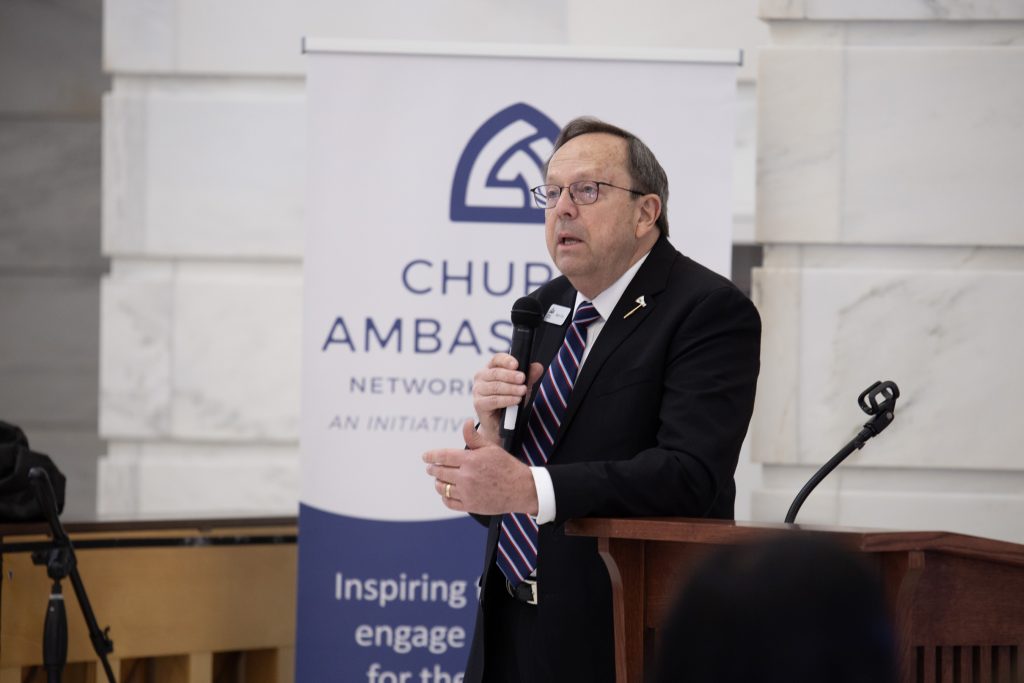Lawmakers Have Filed 40 Proposed Constitutional Amendments This Year

The Arkansas Constitution lets the legislature vote to place up to three constitutional amendments on the ballot at a November general election.
If the voters approve an amendments, it becomes part of the state constitution.
This year, lawmakers have filed 40 proposed constitutional amendments, and it is possible the legislature will begin voting on these amendments very soon.
Below is a very brief explanation of each proposed constitutional amendment that is currently in play at the legislature.
S.J.R. 1: An Amendment to the Arkansas Constitution to Require a Vote of Three-Fourths of Each House of the General Assembly to Enact, Amend, or Repeal Laws Concerning Access to Public Records or Access to Public Meetings (by Sen. Bryan King, R — District 28). This proposed constitutional amendment would require a ¾ vote of the Arkansas House and Arkansas Senate to amend a law concerning access to public records.
S.J.R. 2: A Constitutional Amendment to Create the Arkansas Apportionment Commission to Apportion Districts for the House of Representatives, the Senate, and the United States House of Representatives (by Sen. Bryan King, R — District 28). This proposed constitutional amendment would create the Arkansas Apportionment Commission to help oversee legislative and congressional redistricting in Arkansas.
S.J.R. 3: A Constitutional Amendment Concerning the Membership of the State Highway Commission (by Sen. Bryan King, R — District 28). This proposed constitutional amendment would change the membership and terms of the State Highway Commission.
S.J.R. 4: An Amendment to the Arkansas Constitution to Provide That the Annual School Election Shall Not Be Held if the Proposed Rate of Tax Levy Is the Same as Last Approved and No Other Matters Are to Be Decided (by Sen. Justin Boyd, R — District 27). This proposed constitutional amendment would clarify that an annual ad valorem tax will not appear on an annual school election ballot if the tax rate is the same as previously approved, and a school election will not be held if there is nothing else to vote on.
S.J.R. 5: An Amendment to the Arkansas Constitution to Repeal the Office of Lieutenant Governor (by Sen. Bryan King, R — District 28). This proposed constitutional amendment would eliminate the office of Lieutenant Governor in Arkansas.
S.J.R. 6: A Constitutional Amendment to Provide That Certain Proceeds From the Sale of Medical Marijuana and Casino Gaming Shall Be Used for Crime Reduction and Prevention Programs and Assistance for Post-Release Supervision Services (by Sen. Bryan King, R — District 28). S.J.R. 6 is a “shell amendment” – meaning it only outlines the purpose of the amendment, but it does not explain how it would amend the constitution. Its purpose is to change how certain tax dollars from medical marijuana sales and casino gambling are spent in Arkansas.
S.J.R. 7: An Amendment to the Arkansas Constitution to Amend Arkansas Constitution, Amendment 98, Concerning Medical Marijuana (by Sen. Bryan King, R — District 28). S.J.R. 7 is a “shell amendment” – meaning it only outlines the purpose of the amendment, but it does not explain how it would amend the constitution. Its purpose is to change the constitution concerning medical marijuana.
S.J.R. 8: An Amendment to the Arkansas Constitution to Amend Arkansas Constitution, Amendment 100, Concerning Casino Gaming (by Sen. Bryan King, R — District 28). S.J.R. 8 is a “shell amendment” – meaning it only outlines the purpose of the amendment, but it does not explain how it would amend the constitution. Its purpose is to change the constitution concerning casino gambling.
S.J.R. 9: A Constitutional Amendment Permitting the State of Arkansas to Be Sued as a Defendant in State Court to Enforce Constitutional Rights or as Otherwise Provided by Law (by Sen. Bryan King, R — District 28). S.J.R. 9 is a “shell amendment” – meaning it only outlines the purpose of the amendment, but it does not explain how it would amend the constitution. Its purpose is to change the constitution concerning lawsuits against the State of Arkansas.
S.J.R. 10: A Constitution Amendment Concerning Efficiency in Government; And to Provide for the Creation of the Department of Government Efficiency (by Sen. Bryan King, R — District 28). S.J.R. 10 is a “shell amendment” – meaning it only outlines the purpose of the amendment, but it does not explain how it would amend the constitution. Its purpose is to change the constitution to create a Department of Government Efficiency.
S.J.R. 11: A Constitutional Amendment to Amend Arkansas Constitution, Article 2, § 5, to Protect the Right to Keep and Bear Arms (by Sen. John Payton, R — District 22). This proposed constitutional amendment would protect the right to keep and bear arms and the right to keep and bear ammunition, firearm accessories, and firearm components.
S.J.R. 12: An Amendment to the Arkansas Constitution Requiring the General Assembly to Establish by Law a Revised Election Process (by Sen. Clarke Tucker, D — District 14). This proposed constitutional amendment would replace Arkansas’ partisan primary election process with a nonpartisan primary – or “jungle primary” – election process.
S.J.R. 13: A Constitutional Amendment to Allow a Candidate for Supreme Court Justice, Court of Appeals Judge, Circuit Judge, or District Judge to Declare His or Her Party Affiliation or Independent Status When Running for Judicial Office (by Sen. Jim Dotson, R — District 34). This proposed constitutional amendment would let judicial candidates in Arkansas have a political party affiliation listed next to their names on the ballot.
S.J.R. 14: A Constitutional Amendment Concerning the Determination of the True Value in Money of Real Property for Assessment Purposes (by Sen. Jim Dotson, R — District 34). S.J.R. 14 is a “shell amendment” – meaning it only outlines the purpose of the amendment, but it does not explain how it would amend the constitution. Its purpose is to change the constitution concerning property assessment.
S.J.R. 15: A Constitutional Amendment Concerning Economic Development in the State of Arkansas; And Authorizing the General Assembly to Provide for the Creation of Economic Development Districts to Promote Economic Development (by Sen. Jonathan Dismang, R — District 18). This proposed constitutional amendment would let the General Assembly give cities, counties, and cooperative areas the ability to establish economic development districts financed by bonds, loans, and public grants.
S.J.R. 16: An Amendment to the Arkansas Constitution to Exempt Certain Real Property From Property Tax; And to Create Property Tax Exemptions for Certain Individuals (by Sen. Steve Crowell, R — District 3). S.J.R. 16 is a “shell amendment” – meaning it only outlines the purpose of the amendment, but it does not explain how it would amend the constitution. Its purpose is to change property tax exemptions in Arkansas.
S.J.R. 17: An Amendment to the Arkansas Constitution to Create the Arkansas Taxpayer Bill of Rights (by Sen. Jim Dotson, R — District 34). This proposed constitutional amendment would require a ¾ vote of the General Assembly to levy new taxes, raise taxes, or extend taxes. The amendment would also repeal a provision in the constitution that prevents the General Assembly from raising certain taxes without a vote of the people, and it would amend the state’s budgeting practices.
S.J.R. 18: The Citizens Only Voting Amendment (by Sen. John Payton, R — District 22). This proposed constitutional amendment would place a provision in the constitution saying that only U.S. citizens may vote in Arkansas.
S.J.R. 20: A Constitutional Amendment Concerning the Vote Requirements for Constitutional Amendments to Be Considered Approved at the General Election (by Sen. Bryan King, R — District 28). S.J.R. 20 is a “shell amendment” – meaning it only outlines the purpose of the amendment, but it does not explain how it would amend the constitution. Its purpose is to amend the vote requirements for constitutional amendments.
S.J.R. 21: A Constitutional Amendment Concerning the Vote Requirements for Initiated Acts and Constitutional Amendments to Be Considered Approved at the General Election (by Sen. Bryan King, R — District 28). S.J.R. 21 is a “shell amendment” – meaning it only outlines the purpose of the amendment, but it does not explain how it would amend the constitution. Its purpose is to amend the vote requirements for initiated acts.
S.J.R. 22: A Constitutional Amendment Concerning the Qualifications to Vote in an Election (by Sen. Greg Leding, D — District 30). This proposed constitutional amendment would let a 17-year-old vote in a primary election if he or she will be 18 at the time of the general election.
S.J.R. 24: An Amendment to the Arkansas Constitution Concerning Ballot Titles for Initiated Measures (by Sen. Mark Johnson, R — District 17). S.J.R. 21 is a “shell amendment” – meaning it only outlines the purpose of the amendment, but it does not explain how it would amend the constitution. Its purpose is to ensure titles for ballot measures are readable, clear, concise, and no more than 500 words long.
H.J.R. 1001: A Constitutional Amendment to Create the Citizens’ Redistricting Commission and to Repeal the Board of Apportionment (by Rep. Andrew Collins, D — District 73). This proposed constitutional amendment would create a new commission to oversee legislative and congressional redistricting in Arkansas.
H.J.R. 1002: An Amendment to the Arkansas Constitution to Repeal the Exception to the Prohibition of Slavery and Involuntary Servitude (by Rep. Jay Richardson, D — District 49). This proposed constitutional amendment would repeal a provision in the Arkansas Constitution that lets prisoners be required to work as punishment for a crime.
H.J.R. 1003: The Arkansas Government Disclosure Amendment (by Rep. Andrew Collins, D — District 73). This proposed constitutional amendment would amend how the General Assembly makes laws concerning government transparency and accountability.
H.J.R. 1005: An Amendment to the Arkansas Constitution to Create the Arkansas Taxpayer Bill of Rights (by Rep. Wayne Long, R — District 39). This proposed constitutional amendment would require a ¾ vote of the General Assembly to levy new taxes, raise taxes, or extend taxes. The amendment would also repeal a provision in the constitution that prevents the General Assembly from raising certain taxes without a vote of the people, and it would amend the state’s budgeting practices.
H.J.R. 1006: An Amendment to the Arkansas Constitution Providing That a Governmental Body Shall Not Use State or Local Funds to Enter Into a Contract With a Lobbyist for Lobbying Purposes (by Rep. Brit McKenzie, R — District 7). This proposed constitutional amendment would prevent governmental bodies from contracting with lobbyists to lobby on their behalf.
H.J.R. 1007: A Constitutional Amendment to Create a Procedure for the Recall of Certain Elected Officials (by Rep. Fran Cavenaugh, R — District 30). This proposed constitutional amendment would create a recall process for Arkansas’ governor, lieutenant governor, attorney general, secretary of state, treasurer, auditor, land commissioner, lawmakers, judges, and county officials.
H.J.R. 1008: An Amendment to the Arkansas Constitution Concerning the Taxation of Personal Property and Real Property in the State of Arkansas (by Rep. Stephen Meeks, R — District 42). This proposed constitutional amendment would outline legislative processes for reducing or levying property taxes and provide distinctions between real property taxes and personal property taxes.
H.J.R. 1009: An Amendment to the Arkansas Constitution to Be Known as the Arkansas Victims’ Bill of Rights; And to Provide Rights for Victims of Misdemeanor and Felony Offenses, Including Victims in the Adult and Juvenile Justice Systems (by Rep. Karilyn Brown, R — District 67). This proposed constitutional amendment would outline rights and protections for victims who are harmed by a crime – including the right to be treated fairly, protected from the person who committed the crime, and to have the case resolved in a timely manner.
H.J.R. 1010: A Constitutional Amendment to Provide That by a Two-Thirds Vote, the Senate May Remove Members of Certain Boards and Commissions for Cause Only, After Notice and Hearing (by Rep. Steve Unger, R — District 19). This proposed constitutional amendment would let the Arkansas Senate remove certain state board or commission members upon a ⅔ vote.
H.J.R. 1011: A Constitutional Amendment Concerning the Consideration of Bills Other Than Appropriation Bills During a Fiscal Session of the General Assembly (by Rep. Stephen Meeks, R — District 42). This proposed constitutional amendment would let the Arkansas Legislature consider non-budget measurers during its fiscal sessions if the measure is filed within the first seven days of the fiscal session.
H.J.R. 1012: An Amendment to the Arkansas Constitution to Repeal Provisions Concerning the Reappraisal and Reassessment of Real Property; And to Amend Arkansas Constitution, Amendment 79, Concerning Real Property Taxes (by Rep. Scott Richardson, R — District 13). This proposed constitutional amendment would generally prevent property from being reassessed for tax purposes unless it is given or sold to another person.
H.J.R. 1013: A Constitutional Amendment to Provide That Certain Vacancies Shall Be Filled by Appointment by the Governor (by Rep. Aaron Pilkington, R — District 45). This proposed constitutional amendment would let the governor appoint people to fill vacancies in elected offices.
H.J.R. 1014: A Constitutional Amendment Concerning Economic Development in the State of Arkansas; And Authorizing the General Assembly to Provide for the Creation of Economic Development Districts to Promote Economic Development (by Rep. Howard Beaty, R — District 95). This proposed constitutional amendment would let the General Assembly give cities, counties, and cooperative areas the ability to establish economic development districts financed by bonds, loans, and public grants.
H.J.R. 1015: A Constitutional Amendment to Ensure Transparency by Requiring a Judicial Candidate to Declare His or Her Political Party Affiliation or Independent Status When Running for Office (by Rep. Robin Lundstrum, R — District 18). This proposed constitutional amendment would require judicial candidates in Arkansas to have a political party affiliation listed next to their names on the ballot.
H.J.R. 1016: A Constitutional Amendment to Repeal the Provision of Arkansas Constitution, Article 5, § 1, Allowing the Sponsor of an Initiative or Referendum Petition to Correct or Amend a Petition (by Rep. David Ray, R — District 69). This proposed constitutional amendment would eliminate the “cure period” for ballot initiative sponsors to correct defective petitions or gather additional signatures if their measure fails to make the ballot.
H.J.R. 1017: A Constitutional Amendment Providing That a Proposed State-Wide Initiated Act or Constitutional Amendment Shall Become a Law When Approved by a Majority of the Votes Cast in the Election and a Majority of the Counties of the State (by Rep. David Ray, R — District 69). This proposed constitutional amendment would require ballot measures to pass in a majority of counties across the state and receive a majority vote in order to become law.
H.J.R. 1018: The Citizens Only Voting Amendment (by Rep. David Ray, R — District 69). This proposed constitutional amendment would place a provision in the constitution saying that only U.S. citizens may vote in Arkansas.
H.J.R. 1019: An Amendment to the Arkansas Constitution to Remove References to Greyhound Racing From Arkansas Constitution, Amendment 100 (by Rep. Stephen Meeks, R — District 42). This proposed constitutional amendment would remove references to greyhound racing from the Arkansas Constitution, in light of the fact that Southland Casino in West Memphis no longer conducts greyhound racing.





